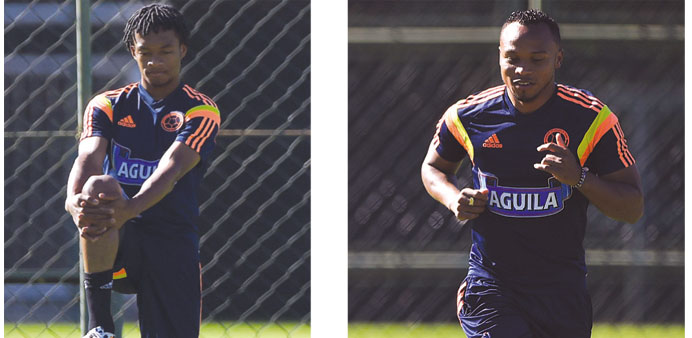Colombia’s Juan Guillermo Cuadrado (left) and Camilo Zuniga.
DPA/Sao Paulo
Juan Guillermo Cuadrado and Camilo Zuniga shine in Italy’s Serie A and in Colombia’s World Cup squad, but they have less positive things in common too.
The two men were born in the banana-growing Colombian region of Uraba, near the Panamanian border, which was shaken by the violence of right-wing paramilitaries in the 1980s and 1990s.
Cuadrado, 26, was only four when he heard shots inside his home in the village of Necocli. He hid under a bed, which may have saved him from a stray bullet, and when he came out he found the dead body of his father, who worked in a banana field.
Zuniga, 28, was born 85 kilometres away in Chigorodo, also in the warm Uraba. Like Cuadrado, he was poor, and his football-crazy family bought his first sports shoes in instalments.
Fiorentina midfielder Cuadrado and Napoli right-back Zuniga grew up playing football on dirt and cement pitches, with rag balls and barefoot.
Cuadrado left Necocli at the age of 12 for the Uraba city of Apartado, and eventually moved on to Medellin, where he got a chance in the youth scheme of Independiente Medellin.
Zuniga also arrived in Colombia’s second-largest city, but to play for Atletico Nacional.
The two men are now millionaires who have their families with them in Europe and enjoy a life of comfort, but they have not forgotten their roots and support local children.
Zuniga was in Chigorodo ahead of the World Cup to supervise the work of his foundation, which helps around 70 children who dream of being professional footballers, like he once did. “I play for you because I have you in my heart,” Zuniga told them.
Cuadrado also cooperates with the foundation, which goes beyond football and helps provide education and food for poor children.
It was for this cause that Cuadrado started to auction off last year the shirts he got from stars like Francesco Totti, Andrea Pirlo, Robinho or Kevin-Prince Boateng.
For all his traumatic experiences, Cuadrado’s memories of his native Uraba focus on food.
“I miss ‘calentao,’ that was really tasty,” he says of a dish with beans or lentils, rice and potatoes cooked with herbs.
His mother, Marcela Bello, who is also with him in Brazil and helps fix his trademark curls, says she tries to make the dish in Italy too.

